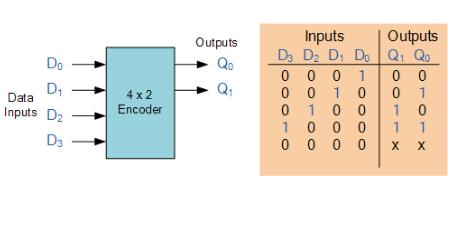Digital Encoders:
Encoders process all their data inputs one at a time to produce an equivalent binary code.

One of the main disadvantages of typical digital encoders is that they can produce an incorrect output code when more than one input is available at a logic "1" level.
Digital Decoder:
A binary decoder is the inverse of an encoder and is another combinational logic circuit built from separate logic gates.

A binary decoder converts "n" binary input signals into an equivalent code using 2n outputs, as the name "decoder" suggests to translate or decode coded information from one format to another.
Binary decoders are another form of digital logic device that have inputs of 2-bit, 3-bit, or 4-bit codes based on the number of input data lines, therefore a decoder with a set of two or more bits is characterized as an n-bit code and thus can represent 2n different values. In general, a decoder converts a binary value to a non-binary value by changing exactly one of its n outputs to a logic "1."